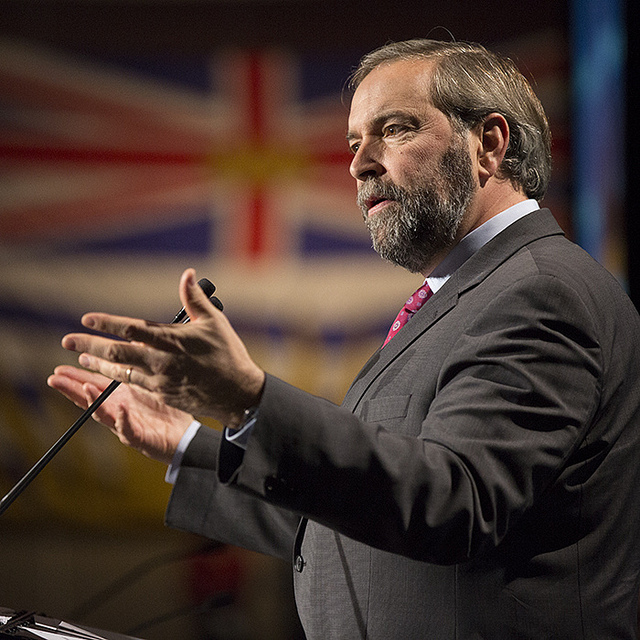Chip in to keep stories like these coming.
In 2012, when Tom Mulcair was a candidate to lead the New Democratic Party, the Toronto Star reported on his negotiations with the Harper government, five years earlier, about a possible job.
That 2012 story mentioned the possibility of Mulcair heading an unnamed “environmental agency” at a salary rumoured to be in the $150,000 range.
Over the years there have been other reports about discussions between Mulcair and the Conservatives — discussions the current Official Opposition leader has never denied.
Two days before Canada Day 2015, Maclean’s magazine decided to resuscitate the story, claiming to have new information.
What is supposedly new comes from former Harper communications director, Dimitri Soudas, and an unnamed Conservative-connected source.
The supposed new “fact” is that in 2007 Mulcair was offered $180,000 to act in some ephemeral environment adviser capacity, with the understanding that he would ultimately run for the Conservatives. Soudas claims Mulcair wanted more money — $300,000 to be exact.
If Soudas has any current political affiliation it is Liberal, via his relationship with Mississauga MP Eve Adams.
Adams famously crossed the floor from Stephen Harper’s team to Justin Trudeau’s, and is now seeking the Liberal nomination in the Toronto riding currently held by Finance Minister Joe Oliver.
Not money but Kyoto
Mulcair flatly denied Soudas’ story. He said his 2007 discussions with Conservative officials (which did not include Soudas) centred on the National Round Table on the Environment and the Economy.
They broke down, says the NDP leader, not over money, but over the Harper government’s negative attitude toward the Kyoto Accord on global warming. In 2007, when Harper had only a minority, his government was coy about Kyoto. Shortly after the Conservatives won their majority in 2011, they truculently walked away from Canada’s Kyoto commitments.
As for the National Roundtable, which had been created as an independent body by Canada’s most recent Conservative government prior to Harper’s, that of Brian Mulroney, Harper did not wait long to kill that either. He did so in 2012.
Instead of heading an agency for which the Conservatives had no respect, at a notional salary about which we have no clarity, to say the least, Mulcair decided to run in a byelection for a party that had never won more than one seat in Quebec: the NDP. And he decided to do so in the Liberal stronghold of Outremont.
Maclean’s obviously felt a bit uncomfortable about its original report because later the same day the magazine posted a second story.
This one quoted Mulcair’s statement that he never had any intention of running as a Conservative. It quoted the NDP leader as saying he was, in fact, first approached by Harper cabinet minister and (like Mulcair) former Quebec Liberal minister, Lawrence Cannon.
Maclean’s tried to claim that Cannon confirmed its original story when he said Mulcair “did not dismiss the idea of running for the Conservatives.”
“Did not dismiss”: carefully chosen words those. Mulcair also “did not dismiss” the idea of bungee jumping from the top of the Peace Tower.
Otherwise, Cannon seems to confirm Mulcair’s version.
Maclean’s quotes Cannon as saying, via email, that “discussions focused on becoming the president of the National Round Table on the Environment and the Economy” and that the current NDP leader “did indeed raise the issue of the Kyoto Protocol.”
‘Another source’ confirms a private phone call. How?
And what about the money question, on which Soudas and Mulcair have diametrically opposite recollections?
Maclean’s second story says Soudas sticks by his version, but pointedly adds that the former Harper staffer has no “paper trail” to support his tale. He and Mulcair, Maclean’s quotes Soudas as saying, spoke only “by phone.” One presumes that if there existed any email or other piece of evidence that the money conversation happened, someone would have produced it by now.
The best Maclean’s can do to buttress a story that otherwise relies exclusively on Soudas’ recollection of a telephone conversation, and nothing more, is to say that “another source close to the government” confirmed Soudas’s story.
Okay. Who, then, is this single “other source” and why does this person require anonymity?
Was “the source” standing next to Soudas when he made that phone call?
Was this unnamed person part of discussions as to what to offer Muclair? Did the mystery source simply hear about it all from Soudas? In that case the source’s source would have been Soudas himself.
We do not, in fact, know anything about what that “other source” told Maclean’s, or how this person could have corroborated what Soudas told Maclean’s happened during a private telephone conversation.
Based on what it reports, if Maclean’s thought it was buttressing its story by quoting this unnamed person, it was constructing a buttress of sand.
In truth, Maclean’s has one source for its story: former Conservative and now Liberal MP Eve Adams’ fiancé, Dimitri Soudas. Readers can decide for themselves whether or not Soudas might have any interest in damaging the NDP leader’s reputation.
The only other person Maclean’s quotes by name, aside from Mulcair himself, is Lawrence Cannon. He confirms the Official Opposition leader’s version, on two key points: the job being discussed was president of the National Round Table on the Environment and the Economy, and Mulcair did, from the outset, express concern about the Conservatives’ stance on the Kyoto Accord.
And so, why has this old, non-story received such widespread attention? Why indeed? Mulcair and the NDP seem to be making at least some folks more than a little nervous.
Enough said.
Chip in to keep stories like these coming.
Photo: flickr/ bcndp



